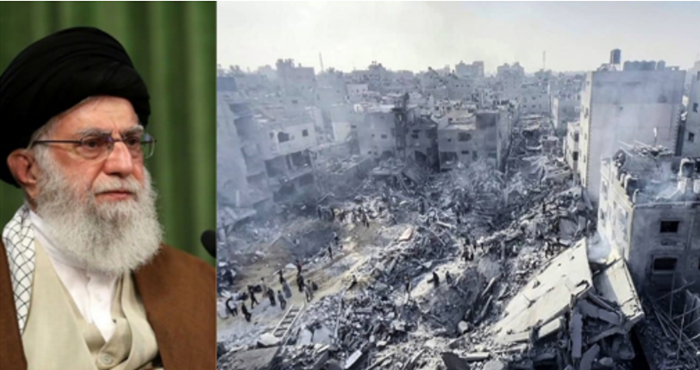
Amidst the vibrancy of the Persian New Year, Iran’s Supreme Leader, Ali Khamenei, made a resounding proclamation, elevating the Palestinian cause and the tumultuous situation in Gaza to the apex of global concerns.
Within his discourse, Khamenei underscored the paramount importance of resistance in Western Asia, casting it as an issue of critical significance. This declaration, however, is not merely a geopolitical assertion but a strategic maneuver, carefully orchestrated amidst the backdrop of mounting internal challenges besieging Iran’s regime.
Undoubtedly, the foremost preoccupation of the regime remains the looming specter of internal dissent and the burgeoning resistance movement among the Iranian populace. In a bid to forestall or mitigate this existential threat, Khamenei has resorted to stoking regional conflicts, callously disregarding the lives of innocent civilians in Gaza and Palestine.
This stratagem bears a striking resemblance to the playbook of the regime’s progenitor, Ruhollah Khomeini, during the protracted Iran-Iraq War of the 1980s. Confronted with the imperative of quelling opposition forces and consolidating power, Khomeini perceived engagement in the war as indispensable.

Fast forward three and a half decades, and the echoes of history reverberate in the sentiments expressed by Ahmad Alamolhoda, a senior cleric and regime stalwart. Alamolhoda’s remarks underscore Khamenei’s fervent belief in the transformative potential of the Gaza conflict, positing it as a pivotal moment in reshaping global perceptions and undermining the hegemony of Western powers.
However, this purported “historical change” betrays a palpable sense of desperation pervading Khamenei’s regime a desperation rooted in the relentless pursuit to avert its impending demise. Yet, historical precedent suggests that such desperation may only delay the inevitable. Khomeini’s eventual capitulation to a ceasefire was not borne out of a newfound commitment to peace but rather a pragmatic concession in the face of mounting internal and external pressures.
Similarly, Khamenei’s failure to extract tangible strategic gains from the Gaza provocations is becoming increasingly apparent. The regime’s recent parliamentary elections, marred by voter apathy and widespread disillusionment, stand as a poignant testament to this strategic miscalculation. Despite the absence of a democratic alternative during Khomeini’s era, Khamenei finds himself confronted with a resolute Iranian Resistance, both domestically and internationally, that refuses to acquiesce to the regime’s tyrannical grip.

In this intricate geopolitical chessboard, Khamenei’s gambit in Gaza appears to have backfired, further exacerbating the regime’s isolation and emboldening its adversaries. As the Iranian Resistance continues to chip away at the regime’s foundations, the specter of change looms ever closer, heralding a new chapter in Iran’s tumultuous history.

MEK Iran (follow us on Twitter and Facebook), Maryam Rajavi’s on her site, Twitter & Facebook, NCRI (Twitter & Facebook), and People’s Mojahedin Organization of Iran – MEK IRAN – YouTu







